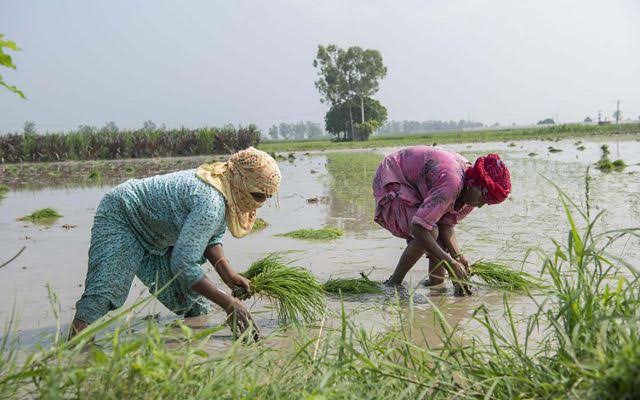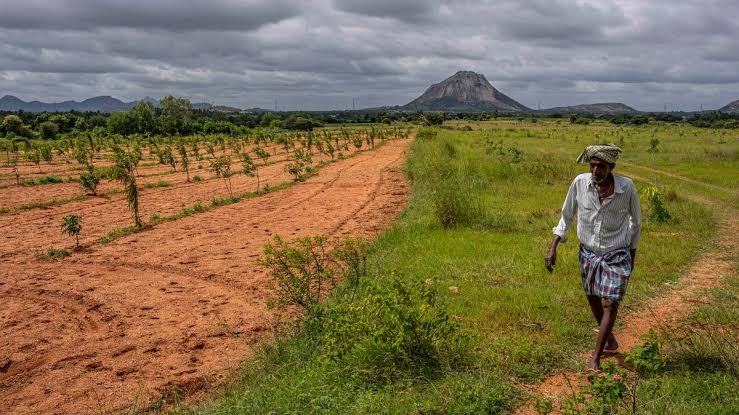The impact of global warming and climate change on farmers has become a growing concern, affecting livelihoods and food security across the country. Changing weather patterns, erratic rainfall, rising temperatures, and extreme climatic events have put immense pressure on agricultural productivity, particularly in states like Uttar Pradesh. Recognizing these challenges, the government has implemented various measures to mitigate the adverse effects of climate change on farming.
 The National Action Plan on Climate Change (NAPCC) serves as a comprehensive framework to help the country adapt to climate change while ensuring ecological sustainability. Under this, the National Mission for Sustainable Agriculture (NMSA) focuses on making farming more resilient through various initiatives. Programs such as “Per Drop More Crop” promote efficient water usage through micro-irrigation techniques like drip and sprinkler systems, ensuring farmers can make the most of available water resources. Rainfed Area Development supports integrated farming practices, which enhance productivity and reduce risks associated with unpredictable weather. Additionally, the Soil Health & Fertility scheme encourages balanced fertilizer use alongside organic manure and bio-fertilizers to maintain soil health, ensuring long-term sustainability of farmlands.
The National Action Plan on Climate Change (NAPCC) serves as a comprehensive framework to help the country adapt to climate change while ensuring ecological sustainability. Under this, the National Mission for Sustainable Agriculture (NMSA) focuses on making farming more resilient through various initiatives. Programs such as “Per Drop More Crop” promote efficient water usage through micro-irrigation techniques like drip and sprinkler systems, ensuring farmers can make the most of available water resources. Rainfed Area Development supports integrated farming practices, which enhance productivity and reduce risks associated with unpredictable weather. Additionally, the Soil Health & Fertility scheme encourages balanced fertilizer use alongside organic manure and bio-fertilizers to maintain soil health, ensuring long-term sustainability of farmlands.
To protect farmers from financial losses due to climate-induced disasters, the government has also strengthened crop insurance schemes. The Pradhan Mantri Fasal Bima Yojana and the Restructured Weather-Based Crop Insurance Scheme provide financial security against crop failure, helping farmers recover from damages caused by unexpected weather conditions. Furthermore, specialized missions such as the Mission for Integrated Development of Horticulture, Agroforestry, and the National Bamboo Mission promote climate-resilient agricultural practices, offering farmers alternative sources of income and stability.
In a significant step towards climate adaptation, the Indian Council of Agricultural Research (ICAR) has been implementing the National Innovations in Climate Resilient Agriculture (NICRA) program. This initiative focuses on developing and demonstrating climate-resilient technologies in vulnerable regions. In Uttar Pradesh, villages across 17 districts, including Baghpat, Bahraich, Banda, and Gorakhpur, have been selected for these interventions. Techniques such as system of rice intensification, direct seeding of rice, zero-till wheat sowing, and cultivation of drought- and heat-tolerant crop varieties have been introduced to help farmers adapt to extreme weather conditions. Additionally, efforts have been made to reduce environmental impact by promoting the in-situ incorporation of crop residues rather than burning them.
Capacity-building programs have also been conducted to educate farmers on climate-resilient farming techniques, equipping them with the knowledge to navigate the challenges posed by a rapidly changing climate. These measures reflect the government’s commitment to safeguarding the interests of farmers and ensuring the sustainability of Indian agriculture. However, the road ahead remains challenging, and continuous efforts are needed to strengthen resilience, improve access to technology, and provide financial security to those whose livelihoods depend on the land.




